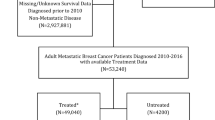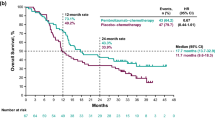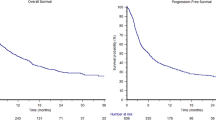Abstract
Purpose
Bevacizumab has demonstrated survival benefit in metastatic colorectal cancer (mCRC) patients when combined with chemotherapy. Several randomized clinical studies have evaluated bevacizumab in combination with chemotherapy. Meta-analysis was performed to better assess the efficacy and safety of bevacizumab with chemotherapy for mCRC.
Materials and methods
Five clinical trials randomizing a total of 3,103 mCRC patients to chemotherapy alone or to the combined treatment of chemotherapy plus bevacizumab were identified. The efficacy data included progression-free survival (PFS), overall survival (OS), and overall response rate (ORR), and the safety data contained the 60-day all-cause mortality rate, adverse events (AEs), and specific toxicity such as hypertension, thrombosis, bleeding, proteinuria, gastrointestinal perforation, diarrhea, and leucopenia.
Result
There was a significant PFS benefit (P = 0.00; hazards ratio [HR] = 0.66) and OS benefit (P = 0.00; HR = 0.77) in favor of the combined treatment. The ORR was significantly higher on the bevacizumab-containing arm (P = 0.021; relative risk [RR] = 1.5), while CR was comparable between the two arms (P = 0.09). A higher incidence of grade 3/4 AEs, grade 3/4 hypertension, grade 3/4 thromboembolic/thrombotic events, grade 3/4 bleeding, and gastrointestinal perforation was associated with the bevacizumab group. The two treatment groups were similar in terms of grade 3/4 proteinuria, grade 3/4 leukopenia, grade 3/4 diarrhea, and the 60-day all-cause mortality rate.
Conclusion
The addition of bevacizumab to chemotherapy confers a clinically meaningful and statistically significant improvement in OS, PFS, and ORR. Its side effects are predictable and manageable and do not compound the incidence or severity of toxicities from chemotherapy.



Similar content being viewed by others
References
Jemal A, Siegel R, Ward E et al (2008) Cancer statistics, 2008. CA Cancer J Clin 58:71–96
de Gramont A, Bosset J-F, Milan C, Rougier P, Bouché O, Etienne P-L, Marvan F, Louvet C, Guillot T, François E, Bedenne L (1997) Randomized trial comparing monthly low-dose leucovorin and Xuorouracil bolus with bimonthly high-dose leucovorin and Xuorouracil bolus plus continuous infusion for advanced colorectal cancer: a French intergroup study. J Clin Oncol 15:808–815
Colorectal Meta-analysis Collaboration (2000) Palliative chemotherapy for advanced or mCRC. Cochrane Database Syst Rev (2):CD001545
Anonymous (1992) Advanced colorectal cancer meta-analysis project: modulation of fluorouracil by leucovorin in patients with advanced colorectal cancer: evidence in terms of response rate. J Clin Oncol 10:896–903
Cunningham D, Pyrhönen S, James RD, Punt CJA, Hickish TF, Heikkila R, Johannesen TB, Starkhammer H, Topham CA, Awad L, Jacques C, Herait P (1998) Randomised trial of irinotecan plus supportive care versus supportive care alone after Xuorouracil failure for patients with mCRC. Lancet 352:1413–1418
Rougier P, Van Cutsem E, Bajetta E, Niederle N, Possinger K, Labianca R, Navarro M, Morant R, Bleiberg H, Wils J, Awad L, Herait P, Jacques C (1998) Randomised trial of irinotecan versus Xuorouracil by continuous infusion after Xuorouracil failure in patients with mCRC. Lancet 352:1407–1412
de Gramont A, Vignoud J, Tournigand C, Louvet C, André T, Varette C, Raymond E, Moreau S, Le Bail N, Krulik M (1997) Oxaliplatin with high-dose leucovorin and 5-Xuorouracil 48-hour continuous infusion in pretreated mCRC. Eur J Cancer 33:214–219
Saltz LB, Cox JV, Blanke C et al (2000) Irinotecan Study Group: irinotecan plus fluorouracil and leucovorin for mCRC. N Engl J Med 343:905–914
de Gramont A, Figer A, Seymour M et al (2000) Leucovorin and fluorouracil with or without oxaliplatin as first-line treatment in advanced colorectal cancer. J Clin Oncol 18:2938–2947
Rougier P, Bugat R, Douillard JY et al (1997) Phase II study of irinotecan in the treatment of advanced colorectal cancer in chemotherapy naive patients and patients pretreated with fluorouracil-based chemotherapy. J Clin Oncol 15:251–260
Freyer G, Rougier P, Bugat R et al (2000) Prognostic factors for tumour response, progressionfree survival and toxicity in mCRC patients given irinotecan (CPT-11) as second-line chemotherapy after 5FU failure: CPT-11 F205, F220, F221 and V222 study groups. Br J Cancer 83:431–437
Knight RD, Miller LL, Pirotta N et al (2000) First-line irinotecan (C), fluorouracil (F), leucovorin (L) especially improves survival (OS) in mCRC (MCRC) patients (PT) with favorable prognostic indicators. Proc Am Soc Clin Oncol 19:255a, (abstract 991)
Food and Drug Administration Center for Drug Evaluation and Research [FDA CDER] (2000) Camptosar (irinotecan, CPT-11): first-line therapy of mCRC. Presented at the 65th Meeting of the Oncologic Drugs Advisory Committee, March 16. Available at http://www.fda.gov/ohrms/dockets/ac/00/slides/3592sle.ppt
Bleiberg H, Cvitkovic E (1996) Characterisation and clinical management of CPT-11 (irinotecan)-induced adverse events: the European perspective. Eur J Cancer 32A(Suppl 3):S18–S23
Food and Drug Administration Center for Drug Evaluation and Research [FDA CDER] (1996) CPT-11 for the treatment of patients with mCRC that has progressed following initial 5-FU based chemotherapy. Presented at the 50th Meeting of the Oncologic Drugs Advisory Committee, Bethesda, MD, June 13
Rougier P, Bugat R (1996) CPT-11 in the treatment of colorectal cancer: clinical efficacy and safety profile. Semin Oncol 23(1 Suppl 3):34–41
Rothenberg ML, Cox JV, DeVore RF et al (1999) A multicenter, phase II trial of weekly irinotecan (CPT-11) in patients with previously treated colorectal carcinoma. Cancer 85:786–795
Algire GH, Chalkley HW, Legallais FY et al (1945) Vascular reactions of normal and malignant tissue in vivo, I. Vascular reactions of mice to wounds and to normal and neoplastic transplants. J Natl Cancer Inst 6:73–85
Reinmuth N, Parikh AA, Ahmad SA, Liu W, Stoeltzing O, Fan F et al (2003) Biology of angiogenesis in tumors of the gastrointestinal tract. Microsc Res Tech 60:199–207
Ferrara N (1999) Molecular and biological properties of vascular endothelial growth factor. J Mol Med 77:527–543
McMahon G (2000) VEGF receptor signaling in tumor angiogenesis. Oncologist 5:3–10
Kim KJ, Li B, Winer J et al (1993) Inhibition of vascular endothelial growth factor-induced angiogenesis suppresses tumour growth in vivo. Nature 362:841–844
Presta LG, Chen H, O’Connor SJ et al (1997) Humanization of an anti-vascular endothelial growth factor monoclonal antibody for the therapy of solid tumors and other disorders. Cancer Res 57:4593–4599
Kabbinavar F, Hurwitz HI, Fehrenbacher L, Meropol NJ, Novotny WF, Lieberman G et al (2003) Phase II, randomized trial comparing Bevacizumab plus fluorouracil (FU)/Leucovorin (LV) with FU/LV alone in patients with MCRC. J Clin Oncol 21:60–65
Kabbinavar FF, Schulz J, McCleod M, Patel T, Hamm JT, Hecht JR et al (2005) Addition of Bevacizumab to Bolus Fluorouracil and Leucovorin in first-line MCRC: results of a randomized phase II trial. J Clin Oncol 23:3697–3705
Hurwitz H, Fehrenbacher L, Novotny W, Cartwright T, Hainsworth J, Heim W et al (2004) Bevacizumab plus Irinotecan, Fluorouracil, and Leucovorin for MCRC. N Engl J Med 350:2335–2342
Giantonio BJ, Catalano PJ, Meropol NJ, O’Dwyer PJ, Mitchell EP, Alberts SR et al (2007) Bevacizumab in combination with Oxaliplatin, Fluorouracil, and Leucovorin (FOLFOX4) for previously treated mCRC: results from the Eastern Cooperative Oncology Group Study E3200. J Clin Oncol 25:1539–1544
Saltz LB, Clarke S, Diaz-Rubio E, Scheithauer W, Figer A, Wong R et al (2008) Bevacizumab in combination with oxaliplatin-based chemotherapy as first-line therapy in MCRC: a randomized phase III study. J Clin Oncol 26:2013–2019
Parmar MKB, Torri V, Stewart L (1998) Extracting summary statistics to perform meta-analyses of the published literature for survival endpoints. Stat Med 17:2815–2834
Therasse P, Arbuck SG, Eisenhauer EA et al (2000) New guidelines to evaluate the response to treatment in solid tumors: European Organization for Research and Treatment of Cancer, National Cancer Institute of the United States, National Cancer Institute of Canada. J Natl Cancer Inst 92:205–216
Sutton AJ, Abrams KR, Jones DR, Sheldon TA, Song F (2000) Methods for meta-analysis in medical research. Wiley, Chichester
Egger M, Smith GD, Altman DG (2001) Systematic reviews in health care: meta-analysis in context, 2nd edn. BMJ Books, London
Jadad AR, Moore RA, Carroll D, Jenkinson C, Reynolds DJ, Gavaghan DJ et al (1996) Assessing the quality of reports of randomized clinical trials: is blinding necessary? Control Clin Trials 17:1–12
Kjaergard LL, Villumsen J, Gluud C (2001) Reported methodologic quality and discrepancies between large and small randomized trials in meta-analyses. Ann Intern Med 135:982–989
Moher D, Pham B, Jones A, Cook DJ, Jadad AR, Moher M et al (1998) Does quality of reports of randomised trials affect estimates of intervention efficacy reported in meta-analyses? Lancet 352:609–613
Blackwell K, Hurwitz H, Liebérman G, Novotny W, Snyder S, Dewhirst M (2004) Circulating D-dimer levels are better predictors of overall survival and disease progression than carcinoembryonic antigen levels in patients with metastatic colorectal carcinoma. Cancer 101:77–82
Jubb AM, Hurwitz HI, Bai W, Holmgren EB, Tobin P, Guerrero AS et al (2006) Impact of vascular endothelial growth factor-A expression, thrombospondin-2 expression, and microvessel density on the treatment effect of bevacizumab in metastatic colorectal cancer. J Clin Oncol 24:217–227
Zheng H, Chen JZ, Liao WJ, Luo RC (2006) Efficacy of Avastin in combination with irinotecan for metastatic colorectal cancer. Nan Fang Yi Ke Da Xue Xue Bao 26:689–691
Hurwitz HI, Fehrenbacher L, Hainsworth JD, Heim W, Berlin J, Holmgren E et al (2005) Bevacizumab in combination with fluorouracil and leucovorin: an active regimen for first-line metastatic colorectal cancer. J Clin Oncol 23:3502–3508
Goldberg RM, Sargent DJ, Morton RF et al (2004) A randomized controlled trial of fluorouracil plus leucovorin, irinotecan, and oxaliplatin combinations in patients with previously untreated mCRC. J Clin Oncol 22:23–30
Johnson RK, Ringland C, Stokes JB et al (2006) Response rate or time to progression as predictors of survival in trials of mCRC or non-small-cell lung cancer: a meta-analysis. Lancet Oncol 7:741–746
Land SR, Kopec JA, Cecchini RS et al (2007) Neurotoxicity from oxaliplatin combined with weekly bolus fluorouracil and leucovorin as surgical adjuvant chemotherapy for stage II and III colon cancer: NSABP C-07. J Clin Oncol 25:2205–2211
Rougier P, Van Cutsem E, Bajetta E et al (1998) Randomised trial of irinotecan versus fluorouracil by continuous infusion after fluorouracil failure in patients with mCRC. Lancet 352:1407–1412
Sutent (sunitinib malate) prescribing information. Pfizer, New York, NY. Available at https://www.pfizeroncology.com/product-info/sutent-description.jsp?setShowOn=../product-info/product-centers.jsp&setShowHighlightOn=../product-info/sutent-indication.jsp
Nexavar (sorafenib) prescribing information. Onyx Pharmaceuticals, Emeryville, CA. Available at http://www.nexavar.co.uk/pi.htm
Dupont J, Schwartz L, Koutcher J et al (2004) Phase I and pharmacokinetic study of VEGF Trap administered subcutaneously to patients with advanced solid malignancies. J Clin Oncol 22:197, (abstract 3009)
Gordon MS, Cunningham D (2005) Managing patients treated with bevacizumab combination therapy. Oncology 69(Suppl 3):25–33
Rosen L, Kurzrock R, Jackson E et al (2005) Safety and pharmacokinetics of AMG 706 in patients with advanced solid tumors. J Clin Oncol 23(Suppl):195s, (abstract 3013)
Morris C, Jurgensmeier J, Robertson J et al (2006) AZD2171, an oral, highly potent, and reversible inhibitor of VEGFR, signaling with potential for the treatment of advanced colorectal cancer. Presented at 2006 Gastrointestinal Cancers Symposium of the American Society of Clinical Oncology, San Francisco, CA, January 28–30, Abstract 242
Miller KD, Chap LI, Holmes FA et al (2005) Randomized phase III trial of capecitabine compared with bevacizumab plus capecitabine in patients with previously treated metastatic breast cancer. J Clin Oncol 23:792–799
Miller KD, Wang M, Gralow J et al (2005) A randomized phase III trial of paclitaxel versus paclitaxel plus bevacizumab as first-line therapy for locally recurrent or metastatic breast cancer: a trial coordinated by the Eastern Cooperative Oncology Group (E2100). Breast Cancer Res Treat 94(Suppl 1):S6, (abstract 3)
Sandler AB, Gray R, Brahmer J et al (2005) Randomized phase II/III trial of paclitaxel (P) plus carboplatin (C) with or without bevacizumab (NSC #704865) in patients with advanced non-squamous non-small cell lung cancer (NSCLC): an Eastern Cooperative Oncology Group (ECOG) Trial-E4599. J Clin Oncol 23(Suppl):2s, (abstract LBA4)
Avastin (bevacizumab) prescribing information. Genentech, South San Francisco, CA. Available at http://www.cptech.org/ip/health/avastin.html
Ma L, Francia G, Viloria-Petit A et al (2005) In vitro procoagulant activity induced in endothelial cells by chemotherapy and antiangiogenic drug combinations: modulation by lower-dose chemotherapy. Cancer Res 65:5365–5373
Skillings JR, Johnson DH, Miller K et al (2005) Arterial thromboembolic events in a pooled analysis of 5 randomized, controlled trials of bevacizumab with chemotherapy. J Clin Oncol 23(Suppl):196s, (abstract 3019)
Scappaticci FA, Skillings JR, Holden SN, Gerber H, Miller K, Kabbinavar F (2007) Arterial thromboembolic events in patients with metastatic carcinoma treated with chemotherapy and bevacizumab. J Natl Cancer Inst 99:1232–1239
Rougier P, Bugat R, Douillard JY et al (1997) Phase II study of irinotecan in the treatment of advanced colorectal cancer in chemotherapy-naive patients and patients pretreated with fluorouracil-based chemotherapy. J Clin Oncol 15:251–260
Hambleton J, Novotny W, Hurwitz H et al (2004) Bevacizumab does not increase bleeding in patients with mCRC receiving concurrent anticoagulation. J Clin Oncol 22:252, (abstract 3528)
Author information
Authors and Affiliations
Corresponding author
Rights and permissions
About this article
Cite this article
Cao, Y., Tan, A., Gao, F. et al. A meta-analysis of randomized controlled trials comparing chemotherapy plus bevacizumab with chemotherapy alone in metastatic colorectal cancer. Int J Colorectal Dis 24, 677–685 (2009). https://doi.org/10.1007/s00384-009-0655-9
Accepted:
Published:
Issue Date:
DOI: https://doi.org/10.1007/s00384-009-0655-9




